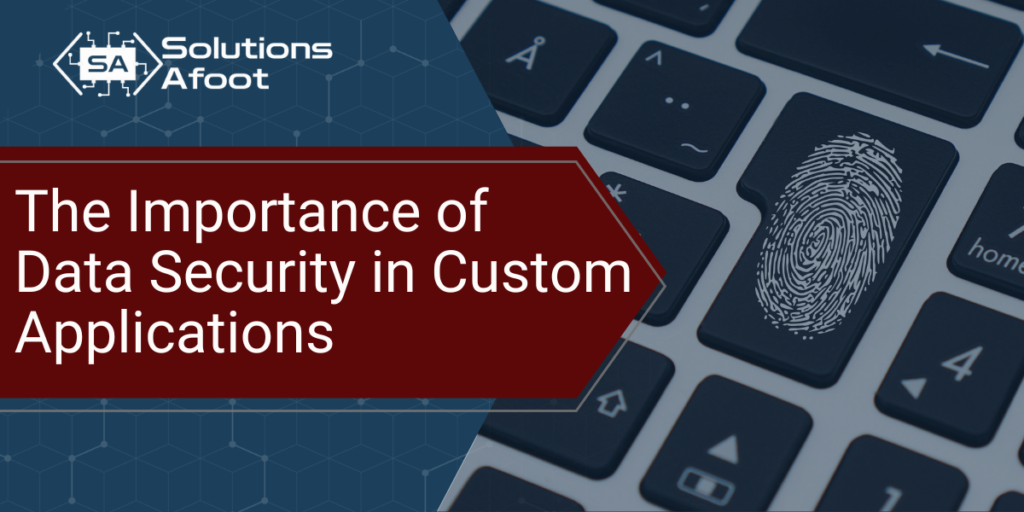The Importance of Data Security in Custom Applications

As businesses increasingly rely on custom applications to manage operations, customer interactions, and data processing, data security has become more critical than ever. A data breach or cyberattack can have devastating consequences, including financial losses, legal penalties, and reputational damage. To mitigate these risks, businesses must prioritize data security in custom applications by implementing best practices, leveraging secure platforms, and ensuring compliance with industry regulations.
Why Data Security Matters in Custom Applications
Unlike off-the-shelf software, custom applications are designed specifically for a business’s unique needs. While this offers flexibility and tailored functionality, it also means that security measures must be intentionally built into the development process. Without proper safeguards, sensitive business and customer data can be vulnerable to attacks, unauthorized access, and regulatory violations.
Common Security Threats in Custom Applications
Understanding potential threats is the first step toward securing your custom applications. Some of the most common security risks include:
1. Data Breaches & Unauthorized Access
Hackers often target custom applications due to weak authentication systems, unprotected databases, and misconfigured permissions. A breach can expose sensitive customer and company information, leading to financial and legal repercussions.
2. Injection Attacks (SQL Injection, XSS, etc.)
Cybercriminals exploit security vulnerabilities in input fields to execute malicious code, steal data, or manipulate system behavior. Without proper validation and sanitization, custom applications remain highly susceptible to these threats.
3. Weak Authentication & Poor Access Controls
Lack of multi-factor authentication (MFA) or role-based access controls (RBAC) can result in unauthorized access, increasing the risk of internal and external threats.
4. Compliance & Regulatory Violations
Businesses in industries like healthcare, finance, and e-commerce must comply with data protection regulations such as HIPAA, GDPR, and SOC 2. Non-compliance can result in hefty fines and legal consequences.
5. Data Loss & Poor Backup Strategies
Without proper data backup and recovery plans, businesses risk losing critical information due to system failures, ransomware attacks, or accidental deletions.
Best Practices for Securing Custom Applications
To ensure data security in custom applications, businesses must adopt robust security measures throughout the development lifecycle. Here are some best practices:
1. Implement Strong Authentication & Access Controls
Enforce multi-factor authentication (MFA) to enhance login security.
Use role-based access controls (RBAC) to limit data access based on user roles.
Monitor user activity logs to detect unauthorized access attempts.
2. Encrypt Sensitive Data
Utilize end-to-end encryption for data transmission and storage.
Store passwords using hashing algorithms like bcrypt or SHA-256.
Avoid storing sensitive data in plain text.
3. Secure APIs & Third-Party Integrations
Use OAuth 2.0 or API keys for secure authentication.
Regularly audit third-party integrations for security vulnerabilities.
Limit API access with rate limiting and access tokens.
4. Conduct Regular Security Audits & Penetration Testing
Perform vulnerability assessments and security audits to identify weaknesses.
Use penetration testing to simulate cyberattacks and test application defenses.
Keep software, frameworks, and plugins up to date to patch vulnerabilities.
5. Ensure Compliance with Data Protection Regulations
Align security practices with GDPR, HIPAA, SOC 2, or PCI-DSS as required.
Implement audit trails to track user activity and data access.
Educate employees on data security policies and best practices.
How Caspio Helps Secure Custom Applications
For businesses developing custom applications, low-code platforms like Caspio offer built-in security features that simplify compliance and data protection. Caspio provides:
Enterprise-grade security with encryption, role-based access controls, and audit logs.
Built-in compliance for HIPAA, GDPR, SOC 2, and PCI-DSS.
Cloud-based hosting with automated backups and disaster recovery options.
Secure API integrations to protect data exchanges with third-party services.
By leveraging Caspio’s security-focused infrastructure, businesses can develop and deploy custom applicationswithout compromising data protection.
Why Choose Solutions Afoot for Secure Custom Application Development?
At Solutions Afoot, we understand that data security is non-negotiable when developing custom applications. Our Caspio-certified developers follow industry best practices to ensure that every application we build is secure, scalable, and compliant with regulatory requirements.
Our Five-Step Approach to Secure Application Development:
Security-First Design – Integrating encryption, authentication, and compliance measures from the start.
Threat Assessment – Identifying vulnerabilities and implementing preventive controls.
Development & Implementation – Building secure applications using Caspio’s robust security framework.
Testing & Compliance Checks – Conducting penetration testing and verifying compliance with industry standards.
Ongoing Support & Security Updates – Providing continuous monitoring, updates, and security patches.
Conclusion: Prioritize Data Security in Custom Applications
As cyber threats continue to evolve, businesses must proactively secure their custom applications to protect sensitive data, maintain compliance, and build customer trust. By implementing strong authentication, encryption, regular security audits, and compliance measures, businesses can reduce security risks and safeguard their digital assets.
Whether you’re developing a customer portal, workflow automation tool, or business management system, prioritizing data security in custom applications is essential for long-term success.
Ready to build a secure custom application? Contact Solutions Afoot today to learn how we can help develop secure, scalable, and compliant applications for your business.
